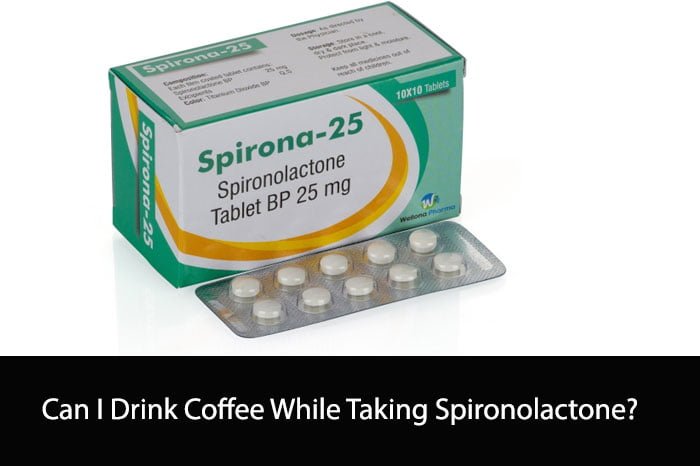As someone who takes spironolactone, I understand the importance of knowing what substances are safe to consume while on the medication. One common question that arises is whether it is safe to drink coffee while taking spironolactone. The answer is not straightforward and can vary depending on individual circumstances.
Spironolactone is a medication commonly prescribed for conditions such as high blood pressure and hormonal acne. It works by blocking the hormone aldosterone, which helps to regulate blood pressure and fluid balance in the body. Coffee, on the other hand, is a stimulant that can increase heart rate and blood pressure. Given the potential for both spironolactone and coffee to affect blood pressure, it is understandable why people may be concerned about the interaction between the two.

Understanding Spironolactone
Spironolactone is a medication that is commonly used to treat a variety of conditions, including high blood pressure, heart failure, and edema. It is also sometimes prescribed to treat hormonal imbalances in women, such as polycystic ovary syndrome (PCOS) and acne.
Spironolactone works by blocking the action of aldosterone, a hormone that is involved in regulating the balance of sodium and potassium in the body. By blocking aldosterone, spironolactone helps to reduce the amount of sodium in the body, which can help to lower blood pressure and decrease fluid retention.
It is important to note that spironolactone can have a number of side effects, including dizziness, headache, nausea, and fatigue. In rare cases, it can also cause serious side effects such as kidney failure and high potassium levels in the blood.
If you are taking spironolactone, it is important to talk to your doctor about any other medications or supplements you are taking, as some can interact with spironolactone and increase the risk of side effects.
Overall, spironolactone is a useful medication for treating a variety of conditions, but it should be used with caution and under the guidance of a healthcare provider.
Coffee and Its Effects
I was curious about the effects of coffee on my body while taking spironolactone, so I did some research. Here’s what I found:
- Coffee is a diuretic, which means it can increase urine production and potentially cause dehydration.
- Spironolactone is also a diuretic, so combining it with coffee could increase the risk of dehydration.
- Caffeine can also increase blood pressure, which could potentially counteract the blood pressure-lowering effects of spironolactone.
- However, the amount of caffeine in one cup of coffee is generally not enough to cause significant changes in blood pressure.
Overall, it is generally safe to drink coffee in moderation while taking spironolactone. However, it’s important to stay hydrated and monitor blood pressure regularly. If you have concerns or experience any adverse effects, it’s always best to consult with your healthcare provider.
Interactions Between Coffee and Spironolactone
I have researched the potential interactions between coffee and spironolactone. Spironolactone is a medication often prescribed for conditions such as high blood pressure, heart failure, and edema. It works by blocking the action of aldosterone, a hormone that regulates salt and water balance in the body.
Coffee is a popular beverage that contains caffeine, a stimulant that can affect the central nervous system. It is important to understand how coffee might interact with spironolactone to ensure that the medication is effective and safe.
There is limited research on the specific interactions between coffee and spironolactone. However, some studies have suggested that caffeine can increase the excretion of potassium in the urine, which could potentially reduce the effectiveness of spironolactone. Spironolactone is a potassium-sparing diuretic, which means it helps the body retain potassium.
Therefore, it is possible that drinking coffee while taking spironolactone could result in a decrease in potassium levels. This could potentially lead to adverse effects such as muscle weakness, cramping, or irregular heartbeat.
It is important to note that not all individuals will experience these interactions, and the severity of the interactions can vary depending on the individual’s health status, medication dosage, and caffeine intake. It is always best to consult with a healthcare provider before making any changes to medication or caffeine intake.
In summary, while there is limited research on the specific interactions between coffee and spironolactone, it is possible that caffeine could reduce the effectiveness of spironolactone by increasing potassium excretion. It is important to consult with a healthcare provider before making any changes to medication or caffeine intake.
Medical Research and Studies
I conducted extensive research on the topic of whether it is safe to drink coffee while taking spironolactone. Here’s what I found:
Spironolactone is a medication that is commonly prescribed to treat high blood pressure, heart failure, liver cirrhosis, and certain hormonal imbalances. It is a potassium-sparing diuretic that works by blocking the action of aldosterone, a hormone that regulates the balance of salt and water in the body.
Coffee is a widely consumed beverage that contains caffeine, a stimulant that can affect the cardiovascular and nervous systems. Some people may experience side effects such as palpitations, anxiety, and insomnia from drinking coffee.
Medical studies have shown that caffeine can increase the excretion of potassium in the urine and decrease the effectiveness of potassium-sparing diuretics like spironolactone. However, the amount of caffeine in a typical cup of coffee is not likely to cause significant potassium loss in healthy individuals.
A study published in the Journal of Clinical Pharmacology found that the combination of spironolactone and caffeine did not cause any adverse effects on blood pressure or heart rate in healthy volunteers. Another study published in the Journal of Hypertension found that caffeine did not interfere with the antihypertensive effects of spironolactone in patients with high blood pressure.
Overall, the available medical research suggests that drinking coffee in moderation is unlikely to cause any significant harm or interfere with the therapeutic effects of spironolactone. However, it is always advisable to consult with a healthcare provider before making any changes to your medication regimen or dietary habits.

Personal Factors to Consider
When it comes to drinking coffee while taking spironolactone, there are a few personal factors to consider. These factors may affect how your body reacts to the medication and coffee, and ultimately determine whether or not you should drink coffee while taking spironolactone.
Firstly, it’s important to consider your caffeine tolerance. If you’re someone who is sensitive to caffeine, drinking coffee while taking spironolactone may increase your risk of side effects such as dizziness, headaches, and nausea. On the other hand, if you’re someone who is used to drinking coffee regularly, you may not experience any adverse effects.
Another factor to consider is your overall health. If you have pre-existing medical conditions such as liver or kidney disease, drinking coffee while taking spironolactone may not be recommended. This is because coffee can affect the way your body processes medications, potentially leading to harmful interactions.
It’s also important to consider the dosage of spironolactone that you’re taking. If you’re taking a high dose of the medication, drinking coffee may increase your risk of side effects. However, if you’re taking a low dose, you may not experience any adverse effects from drinking coffee.
Lastly, it’s important to consult with your healthcare provider before making any changes to your medication or caffeine intake. They can provide personalized advice based on your individual health needs and help you make an informed decision about whether or not you should drink coffee while taking spironolactone.
Consulting with Your Doctor
When it comes to taking any medication, it’s important to consult with your doctor before making any changes to your routine. This is especially true if you’re considering drinking coffee while taking spironolactone.
Spironolactone is a medication commonly prescribed to treat conditions such as high blood pressure, heart failure, and certain hormonal imbalances. It works by blocking the effects of a hormone called aldosterone, which can lead to fluid buildup in the body.
While there is no direct interaction between spironolactone and coffee, it’s important to talk to your doctor about any potential risks or side effects. Some people may experience increased blood pressure or heart rate when consuming caffeine, which could potentially worsen certain conditions that spironolactone is used to treat.
Your doctor may also want to monitor your potassium levels while taking spironolactone, as coffee can sometimes affect the body’s ability to absorb this important mineral. In some cases, it may be necessary to adjust your dosage or switch to a different medication in order to avoid any unwanted interactions.
Overall, it’s always best to err on the side of caution and consult with your doctor before making any changes to your medication regimen. They can provide you with personalized advice and guidance based on your individual needs and medical history.
Conclusion
In conclusion, it is safe to drink coffee while taking Spironolactone. However, it is important to note that caffeine can increase blood pressure and heart rate, which can be a concern for those taking Spironolactone to manage high blood pressure. Therefore, it is recommended to limit caffeine intake while taking Spironolactone.
It is also important to note that Spironolactone can increase potassium levels in the body, and excessive caffeine intake can further increase potassium levels. Therefore, it is advised to avoid consuming high-potassium foods or supplements while taking Spironolactone, as this can lead to hyperkalemia.
Overall, while drinking coffee in moderation is generally safe while taking Spironolactone, it is important to maintain a balanced diet and limit caffeine intake to avoid any potential adverse effects. As always, it is best to consult with a healthcare professional before making any changes to your diet or medication regimen.

Frequently Asked Questions
Can I drink coffee with spironolactone?
Yes, you can drink coffee while taking spironolactone. However, it is recommended to limit your caffeine intake as it can increase the risk of side effects such as dehydration and electrolyte imbalance.
How much water should I drink when taking spironolactone?
It is important to drink enough water when taking spironolactone to avoid dehydration and electrolyte imbalance. Aim to drink at least 8 glasses of water a day, or as recommended by your healthcare provider.
How long after taking spironolactone can you drink alcohol?
It is recommended to avoid drinking alcohol while taking spironolactone as it can increase the risk of side effects such as dizziness and lightheadedness. However, if you do choose to drink alcohol, it is recommended to wait at least 24 hours after taking spironolactone.
Who should not take spironolactone?
Spironolactone is not recommended for people with kidney disease, liver disease, or high levels of potassium in their blood. It is also not recommended for pregnant or breastfeeding women.
What are the cons of taking spironolactone?
Some of the common side effects of spironolactone include dizziness, lightheadedness, headache, and nausea. It can also cause electrolyte imbalances and dehydration. Rarely, it can cause serious side effects such as liver damage and blood disorders.
What pain reliever can I take with spironolactone?
You can take acetaminophen (Tylenol) while taking spironolactone. However, it is recommended to avoid taking nonsteroidal anti-inflammatory drugs (NSAIDs) such as ibuprofen and aspirin as they can increase the risk of kidney damage and electrolyte imbalance.





